#Antitrust
Explore tagged Tumblr posts
Text
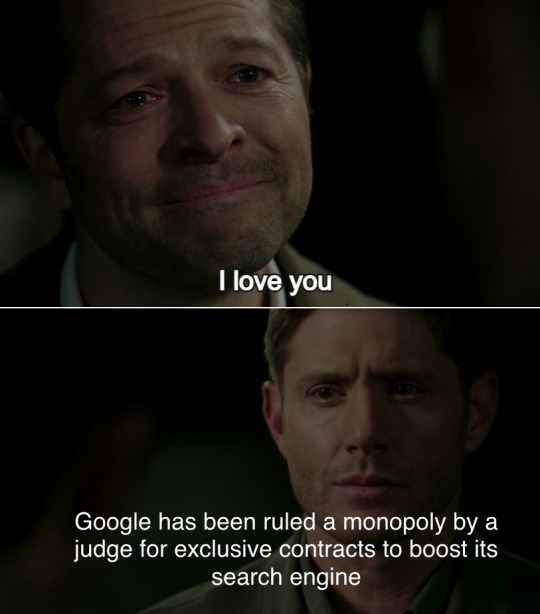
🎉🎉🎉
32K notes
·
View notes
Text

(Source)
#destiel#google#antitrust#google search#monopoly#department of justice#castiel#dean winchester#breaking news
8K notes
·
View notes
Text
Mark Zuckerberg personally lost the Facebook antitrust case

I'm on a 20+ city book tour for my new novel PICKS AND SHOVELS. Catch me at NEW ZEALAND'S UNITY BOOKS in AUCKLAND on May 2, and in WELLINGTON on May 3. More tour dates (Pittsburgh, PDX, London, Manchester) here.

It's damned hard to prove an antitrust case: so often, the prosecution has to prove that the company intended to crush competition, and/or that they raised prices or reduced quality because they knew they didn't have to fear competitors.
It's a lot easier to prove what a corporation did than it is to prove why they did it. What am I, a mind-reader? But imagine for a second that the corporation in the dock is a global multinational. Now, imagine that the majority of the voting shares in that company are held by one man, who has served as the company's CEO since the day he founded it, personally calling every important shot in the company's history.
Now imagine that this founder/CEO, this accused monopolist, was an incorrigible blabbermouth, who communicated with his underlings almost exclusively in writing, and thus did he commit to immortal digital storage a stream – a torrent – of memos in which he explicitly confessed his guilt.
Ladies and gentlepersons, I give you Mark Zuckerberg, founder and CEO of Meta (nee Facebook), an accused monopolist who cannot keep his big dumb fucking mouth shut.
At long, long last, the FTC's antitrust trial against Meta is underway, and this week, Zuck himself took the stand, in agonizing sessions during which FTC lawyers brandished printouts of Zuck's own words before him, asking him to explain away his naked confessions of guilt. It did not go well for Zuck.
In a breakdown of the case for The American Prospect, editor-in-chief David Dayen opines that "The Government Has Already Won the Meta Case," having hanged Zuck on his own words:
https://prospect.org/power/2025-04-16-government-already-won-meta-case-tiktok-ftc-zuckerberg/
The government is attempting to prove that Zuck bought Instagram and Whatsapp in order to extinguish competitors (and not, for example, because he thought they were good businesses that complemented Facebook's core product offerings).
This case starts by proving how Zuck felt about Insta and WA before the acquisitions. On Insta, Zuck circulated memos warning about Insta's growth trajectory:
they appear to be reaching critical mass as a place you go to share photos
and how that could turn them into a future competitor:
[Instagram could] copy what we’re doing now … I view this as a big strategic risk for us if we don’t completely own the photos space.
These are not the words of a CEO who thinks another company is making a business that complements his own – they're confessions that he is worried that they will compete with Facebook. Facebook tried to clone Insta (Remember Facebook Camera? Don't feel bad – neither does anyone else). When that failed, Zuck emailed Facebook execs, writing:
[Instagram's growth is] really scary and why we might want to consider paying a lot of money for this.
At this point, Zuck's CFO – one of the adults in the room, attempting to keep the boy king from tripping over his own dick – wrote to Zuck warning him that it was illegal to buy Insta in order to "neutralize a potential competitor."
Zuck replied that he was, indeed, solely contemplating buying Insta in order to neutralize a potential competitor. It's like this guy kept picking up his dictaphone, hitting "record," and barking, "Hey Bob, I am in receipt of your memo of the 25th, regarding the potential killing of Fred. You raise some interesting points, but I wanted to reiterate that this killing is to be a murder, and it must be as premeditated as possible. Yours very truly, Zuck."
Did Zuck buy Insta to neutralize a competitor? Sure seems like it! For one thing, Zuck cancelled all work on Facebook Camera "since we're acquiring Instagram."
But what about after the purchase. Did Zuck reduce quality and/or raise costs? Well, according to the company, it enacted an "explicit policy of not prioritizing Instagram’s growth" (a tactic called "buy or bury"). At this juncture, Zuckerberg once again put fingers to keyboard in order to create an immortal record of his intentions:
By not killing their products we prevent everyone from hating us and we make sure we don’t immediately create a hole in the market for someone else to fill.
And if someone did enter the market with a cool new gimmick (like, say, Snapchat with its disappearing messages)?
Even if some new competitors spring up, if we incorporate the social mechanics they were using, these new products won’t get much traction since we’ll already have their mechanics deployed at scale.
Remember, the Insta acquisition is only illegal if Zuck bought them to prevent competition in the marketplace (rather than, say, to make a better product). It's hard to prove why a company does anything, unless its CEO, founder, and holder of the majority of its voting stock explicitly states that his strategy is to create a system to ensure that innovating new products "won't get much traction" because he'll be able to quickly copy them.
So we have Zuck starving Insta of development except when he needs to neutralize a competitor, which is just another way of saying he set out to reduce the quality of the product after acquisition, a thing that is statutorily prohibited, but hard to prove (again, unless you confess to it in writing, herp derp).
But what about prices? Well, obviously, Insta doesn't charge its end-users in cash, but they do charge in attention. If you want to see the things you've explicitly asked for – posts from accounts you follow – you have to tolerate a certain amount of "boosted content" and ads, that is, stuff that Facebook's business customers will pay to nonconsensually cram into your eyeballs.
Did that price go up? Any Insta user knows the answer: hell yes. Instagram is such a cesspit of boosted content and ads that it's almost impossible to find stuff you actually asked to see. Indeed, when a couple of teenagers hacked together an alternative Insta client called OG App that only showed you posts from accounts you followed, it was instantly the most popular app on Google Play and Apple's App Store (and then Google and Apple killed it, at Meta's request):
https://pluralistic.net/2023/02/05/battery-vampire/#drained
But why did the price go up? Did it go up because Facebook had neutralized a competitor by purchasing it, and thus felt that it could raise prices without losing customers? Again, a hard thing to prove…unless Zuck happened to put it in writing. Which he did, as Brendan Benedict explains in Big Tech On Trial:
I think we’re badly mismanaging this right now. There’s absolutely no reason why IG ad load should be lower than FB at a time when . . . we’re having engagement issues in FB. If we were managing our company correctly, then at a minimum we’d immediately balance IG and FB ad load . . . But it’s possible we should even have a higher ad load on IG while we have this challenge so we can replace some ads with [People You May Know] on FB to turn around the issues we’re seeing.
https://www.bigtechontrial.com/p/zuckerberg-v-zuckerberg-will-the
So there you have it: Zuck bought Insta to neutralize a competitor, and after he did, he lowered its quality and raised its prices, because he knew that he was operating without significant competitors thanks to his acquisition of that key competitor. Zuck's motivations – as explained by Zuck himself – were in direct contravention of antitrust law, a thing he knew (because his execs explained it to him). That's a pretty good case.
But what about Whatsapp? How did Zuck feel about it? Well, he told his board that Whatsapp was Facebook's greatest "consumer risk," fretting that "Messenger isn’t beating WhatsApp." He blocked Whatsapp ads on Facebook, telling his team that it was "trying to build social networks and replace us." Sure, they'd lose money by turning away that business, but the "revenue is immaterial to us compared to any risk." Sure seems like Zuck saw Whatsapp as a competitor.
Meta's final line of defense in this case is that even if they did some crummy, illegal things, they still didn't manage to put together a monopoly. According to Meta's lawyers – who're billing the company more than $1m/day! – Meta is a tiny fish in a vast ocean that has many competitors, like Tiktok:
https://www.levernews.com/mr-zuckerbergs-very-expensive-day-in-court/
There's only one problem with this "market definition" argument, and that problem's name is Chatty Mark Zuckerberg. On the question of market definition, FTC lawyers once again raised Zuckerberg's own statements and those of his top lieutenants to show that Zuckerberg viewed his companies as "Personal Social Networks" (PSNs) and not as just generic sites full of stuff, competing with Youtube, Tiktok, and everyone else who lets users post things to the internet.
Take Instagram boss Adam Mosseri, who explained that:
Instagram will always need to focus on friends and can never exclusively be for public figures or will cease to be a social product.
And then there was Zuck's memo explaining why he offered $6b for Snapchat:
Snap Stories serves the exact same use case of sharing and consuming feeds of content that News Feed and Instagram deliver. We need to take this new dynamic seriously—both as a competitive risk and as a product opportunity to add functionality that many people clearly love and want to use daily.
And an internal strategy document that explained the competitive risks to Facebook:
Social networks have two stable equilibria: either everyone uses them, or no-one uses them. In contrast, nonsocial apps (e.g. weather apps, exercise apps) can exist [somewhere] along a continuum of adoption. The binary nature of social networks implies that there should exist a tipping point, ie some critical mass of adoption, above which a network will organically grow, and below which it will shrink.
Sure sounds like Facebook sees itself as a "social network," and not a "nonsocial app." And of course – as Dayen points out – when Tiktok (a company Meta claims as a competitor) went up for sale, Meta did not enter a bid, despite being awash in free cash flow.
In Zuckerberg's defense, he's not the only tech CEO who confesses his guilt in writing (recall that FTX planned its crimes in a groupchat called WIREFRAUD). Partly that's because these firms are run by arrogant twits, but partly it's because digital culture is a written culture, where big, dispersed teams expected to work long hours from offices all over the world as well as from their phones every hour of day and night have to rely on memos to coordinate:
https://pluralistic.net/2023/09/03/big-tech-cant-stop-telling-on-itself/
When Dayen claims that "the government has won the Meta case," he doesn't mean the judge will rule in the FTC's favor (though there's a high likelihood that this will happen). Rather, he means that the case has been proven beyond any kind of reasonable doubt, in public, in a way that has historically caused other monopolists to lose their nerve, even if they won their cases. Take Microsoft and IBM – though both companies managed to draw out their cases until a new Republican administration (Reagan for IBM, GWB for Microsoft) took office and let them off the hook, both companies were profoundly transformed by the process.
IBM created the market for a generic, multivendor PC whose OS came from outside the company:
https://www.eff.org/deeplinks/2019/08/ibm-pc-compatible-how-adversarial-interoperability-saved-pcs-monopolization
And Microsoft spared Google the same treatment it had meted out to Netscape, allowing the company to grow and thrive:
https://apnews.com/article/google-apple-microsoft-antitrust-technology-cases-1e0c510088825745a6e74ba3b81b44c6
Trump being Trump, it's not inconceivable that he will attempt to intervene to get the judge to exonerate Meta. After all, Zuck did pay him a $1m bribe and then beg him to do just that:
https://gizmodo.com/zuckerberg-really-thought-trump-would-make-metas-legal-problems-go-away-2000589897
But as Dayen writes, the ire against Meta's monopolistic conduct is thoroughly bipartisan, and if Trump was being strategic here (a very, very big "if"), he would keep his powder dry here. After all, if the judge doesn't convict Meta, Trump won't have wasted any political capital. And if Meta is convicted, Trump could solicit more bribes and favors at the "remedy" stage, when a court will decide how to punish Meta, which could be anything from a fine to a breakup order, to a nothingburger of vague orders to clean up its act.

If you'd like an essay-formatted version of this post to read or share, here's a link to it on pluralistic.net, my surveillance-free, ad-free, tracker-free blog:
https://pluralistic.net/2025/04/18/chatty-zucky/#is-you-taking-notes-on-a-criminal-fucking-conspiracy

#pluralistic#zuck#mark zuckerberg#antitrust#trustbusting#self-incriminating#facebook#meta#trumpism#boss politics#boss politics antitrust#david dayen#petard
3K notes
·
View notes
Text

Article | Paywall Free
"A bid to break up Alphabet Inc.’s Google is one of the options being considered by the Justice Department after a landmark court ruling found that the company monopolized the online search market, according to people with knowledge of the deliberations.
The move would be Washington’s first push to dismantle a company for illegal monopolization since unsuccessful efforts to break up Microsoft Corp. two decades ago. Less severe options include forcing Google to share more data with competitors and measures to prevent it from gaining an unfair advantage in AI products, said the people, who asked not to be identified discussing private conversations.
Regardless, the government will likely seek a ban on the type of exclusive contracts that were at the center of its case against Google. If the Justice Department pushes ahead with a breakup plan, the most likely units for divestment are the Android operating system and Google’s web browser Chrome, said the people. Officials are also looking at trying to force a possible sale of AdWords, the platform the company uses to sell text advertising, one of the people said.
The Justice Department discussions have intensified in the wake of Judge Amit Mehta’s Aug. 5 ruling that Google illegally monopolized the markets of online search and search text ads. Google has said it will appeal that decision, but Mehta has ordered both sides to begin plans for the second phase of the case, which will involve the government’s proposals for restoring competition, including a possible breakup request.
The US plan will need to be accepted by Mehta, who would direct the company to comply. A forced breakup of Google would be the biggest of a US company since AT&T was dismantled in the 1980s."
-via Bloomberg, August 13, 2024
#google#big tech#united states#us politics#justice department#doj#monopoly#big business#antitrust#monopolies#google search#amit mehta#good news#hope
3K notes
·
View notes
Text
Things the Biden-Harris Administration Did This Week #30
August 2-9 2024
The Department of Interior announced the largest investment since 1979 in outdoor recreation and conservation projects. The $325 million will go to support State, territorial, DC, and tribal governments in buying new land for parks and outdoor recreation sites. It also supports expansion and refurbishment of existing sites.
The EPA announced that Birmingham Alabama will get $171 million to update and replace its water system. The city of Birmingham is 70% black and like many black majority cities as struggled with aging water systems and lead pipes causing dangerous drinking water conditions. This investment is part of the Biden-Harris administrations plan to replace all of the nation's lead pipes.
The Department of Energy announced $2.2 billion in investments in the national power grid to help boost resiliency in the face of extreme weather. The projects will add 13 gigawatts of capacity, support 5,000 new jobs and upgrade 1,000 miles of transmission. Major projects will cut power outages in the west, drive down energy prices in New England, add off shore wind, and enable the development of the Standing Rock Sioux Tribe’s wind resources.
The Justice Department won its massive anti-trust case against Google. A federal judge ruled that Google was an illegal monopoly. The DOJ has an ongoing antitrust suit against Apple, while the Federal Trade Commission is suing Facebook and Amazon for their monopolist practices
The US Government announced $3.9 billion in direct aid to Ukraine. The money will help the Government of Ukraine make up for massive budget short falls caused by the war with Russia. It'll help pay the salaries of teachers, emergency workers, and other public employees, as well helping displaced persons, low-income families and people with disabilities.
The Department of Energy announced $190 million to improve air quality and energy upgrades in K-12 schools. The grants to 320 schools across 25 states will impact 123,000 students, 94% of these schools service student bodies where over half the students qualify for free and reduced lunch. In the face of climate change more schools have been forced to close for extreme heat. These grants will help schools with everything from air filtration, to AC, to more robust energy systems, to replacing lighting.
USAID announced $424 million in additional humanitarian aid to the Democratic Republic of the Congo. Due to ongoing conflict and food insecurity, 25 million Congolese are in need of humanitarian aid. This year alone the US has sent close to a billion dollars in aid to the DRC, making it the single largest donor to the crisis.
The Senate approved President Biden's appointment of Stacey Neumann of Maine, Meredith Vacca of New York, and Joseph Saporito Jr. of Pennsylvania to life time federal Judgeships. This brings the total of judges appointed by President Biden to 205. President Biden is the first President who's judicial nominations have not been majority white men, Judge Vacca is the first Asian American to serve in her district court. President Biden has also focused on former public defenders, like Judge Saporito, and former labor lawyers like Judge Neumann, as well as civil rights lawyers.
#Joe Biden#Thanks Biden#kamala harris#politics#US politics#American politics#climate change#antitrust#Google#trust busting#Ukraine#humanitarian aid#judges
1K notes
·
View notes
Text
UH OH Google just lost an antitrust case!
“A federal U.S. judge ruled Monday that Google has illegally held a monopoly in two market areas: search and text advertising.
The landmark case from the government, filed in 2020, alleged that Google has kept its share of the general search market by creating strong barriers to entry and a feedback loop that sustained its dominance. The court found that Google violated Section 2 of the Sherman Act, which outlaws monopolies.
The ruling marks the first anti-monopoly decision against a tech company in decades.”
Article by Rohan Goswami and Jennifer Elias
454 notes
·
View notes
Text
The funniest possible outcome of all these Google antitrust disclosures re: deceptively re-writing people's search queries in order to maximise Google's ad revenue would be if the corporations that paid for those ads decide that Google has been defrauding them the whole time. The ultimate "bite each other's dicks off" scenario.
#computers#technology#internet#search engines#google#antitrust#current events#violence mention#penis metion
2K notes
·
View notes
Text
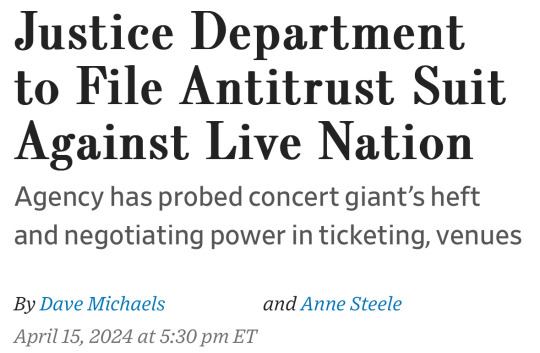

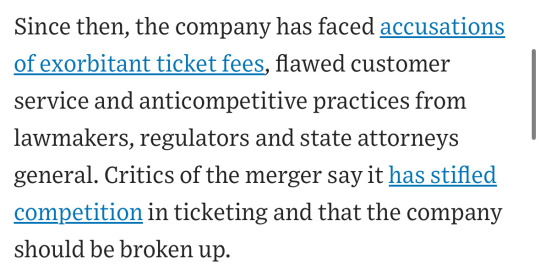
Source

#capitalism#antitrust#politics#us politics#government#the left#progressive#good news#news#current events#criminal justice
430 notes
·
View notes
Text
https://wapo.st/3VmUcnn
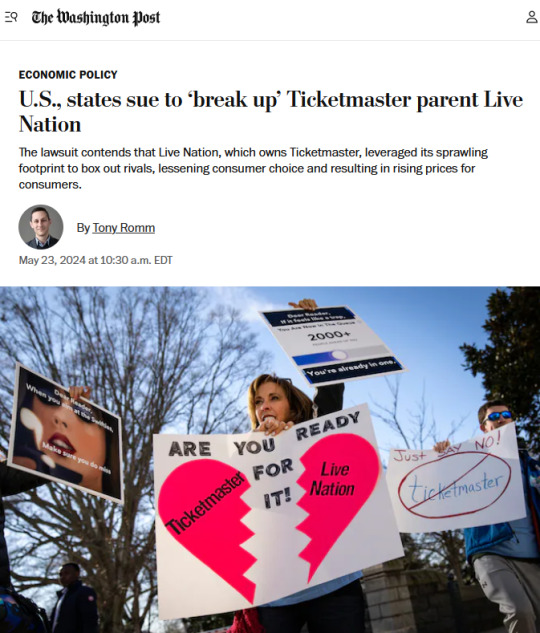
link above is a gift, free to read
Attorney General Merrick Garland is filing an antitrust lawsuit against Live Nation, which owns Ticketmaster! FUCK EM UP!
196 notes
·
View notes
Text
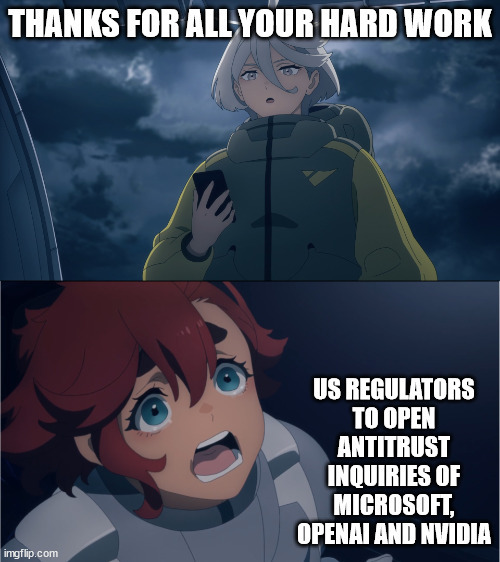
SOURCE
The U.S. Justice Department and Federal Trade Commission will conduct antitrust investigations on Microsoft, OpenAI, and Nvidia regarding their roles in the AI industry, as reported by the New York Times.
The Justice Department will focus on Nvidia, while the FTC will investigate OpenAI and Microsoft, under a deal expected to conclude soon.
The agreement between regulators was made recently and is set to be finalized in the near future, according to sources familiar with the matter.
#sulemio news#sulemio#suletta mercury#miorine rembran#g-witch#g witch#us federal trade commission#ftc#us ftc#antitrust#ftc antitrust#nvidia#microsoft#openai#antitrust lawsuit#lets fucckkkking gooooooo#lfg
192 notes
·
View notes
Text
“In August, a federal judge ruled that Google holds a monopoly in the search market. The ruling came after the government in 2020 filed its landmark case, alleging that Google controlled the general search market by creating strong barriers to entry and a feedback loop that sustained its dominance. The court found that Google violated Section 2 of the Sherman Act, which outlaws monopolies.”

83 notes
·
View notes
Text
Antitrust defies politics’ law of gravity

I'm in the home stretch of my 24-city book tour for my new novel PICKS AND SHOVELS. Catch me in LONDON NEXT TUESDAY (July 1) with TRASHFUTURE'S RILEY QUINN and then a big finish in MANCHESTER NEXT WEDNESDAY (July 2).

In 2014, I read a political science paper that nearly convinced me to quit my lifelong career as an activist: "Testing Theories of American Politics: Elites, Interest Groups, and Average Citizens," published in Perspectives on Politics:
https://www.cambridge.org/core/journals/perspectives-on-politics/article/testing-theories-of-american-politics-elites-interest-groups-and-average-citizens/62327F513959D0A304D4893B382B992B
The paper's authors are Martin Gilens, a UCLA professor of Public Policy; and Northwestern's Benjamin Page, a professor of Decision Making. Gilens and Page studied a representative sample of 1,779 policy issues, analyzing the effect that the preferences of different groups of people had on the outcome. They wanted to find out what drove policy: money, or popularity?
It's money. It's totally, utterly money. When billionaires want something, it literally doesn't matter how much the rest of us hate it, they're gonna get their way. When billionaires hate something, it doesn't matter how popular it is with the rest of us, we're not gonna get it. As Gilens and Page put it:
economic elites and organized groups representing business interests have substantial independent impacts on U.S. government policy, while average citizens and mass-based interest groups have little or no independent influence.
I know the cynics out there are hollering "no duh" at their computers right now, but bear with me here. Gilens and Page's research shows that you and I have no voice in policy outcomes. Based on these findings, the only way we can change society is to try and woo oligarchs so they champion our cause. This reduces democracy to a competition to see who can pour the most honey into a plutocrat's ear. Mass mobilizations – millions of people in the streets – only matter to the extent that they bring a tear to a billionaire's eye.
This just shattered me. I've been haunted by it ever since. I've tried some tactical gambits based on this data, but honestly, I don't want to improve the world by swaying the ultra-rich. Mostly, I've spent the decade since I read the Gilens/Page paper working on mass mobilizations and mass opionion-influencing. I reasoned (or maybe rationalized) that while oligarchs were running the nation now, that was subject to change, and that was a change that I was sure wouldn't come from America's plutocrats committing mass class-suicide.
Then, something incredible happened. All this decade, a tide of antitrust vigor has swept the planet. The EU has passed big, muscular tech competition laws like the Digital Markets Act and the Digital Services Act, and has by God enforced them, and have patched the enforcement weaknesses in the GDPR. EU member-states – France, Germany, Spain – have passed their own big, ambitious national laws that go further than DSA/DMA. Even Ireland – a country that deliberately prostrated itself to US Big Tech – is getting in on the act, with the country's Social Media Czar railing against the "enshittification" of tech:
https://www.independent.ie/business/technology/chairman-of-irish-social-media-regulator-says-europe-should-not-be-seduced-by-mario-draghis-claims/a526530600.html
Not just the EU, of course. Australia and Canada have taken some big swings at Big Tech, and Canada is pressing ahead with its digital services tax of 3% for onshore earnings of tech companies with more than CAD20m in annual turnover, despite the fact that Trump has promised to end all trade talks with Canada in retaliation:
https://financialpost.com/technology/canadas-digital-services-tax-g7
Antitrust fever has swept both of the world's superpowers. Under Trump I, the DOJ and FTC brought key cases against Facebook and Google, and then Biden's antitrust enforcers went to town on all forms of monopoly, carrying on the Trump cases and reviving some of the law's most elegant weapons from a more civilized age, like the Robinson-Patman Act:
https://www.ftc.gov/news-events/news/press-releases/2025/01/ftc-sues-pepsico-rigging-soft-drink-competition
Admittedly, Trump's FTC and DOJ have carried on some of Biden's work, even as they've killed some of the Biden era's most important cases, and made a general Trumpian mockery of the idea that antitrust law is a tool for economic justice:
https://economicpopulist.substack.com/p/weekly-rewind-62725
Trump killing antitrust law is normal. That's what politics have been like for this whole century, and it's what politics are like in every other domain: billionaires get their way on climate, on labor, on whatever bullshit they get into their fool fucking heads:
https://www.usatoday.com/story/entertainment/celebrities/2025/06/27/jeff-bezos-lauren-sanchez-married-wedding-venice/84349820007/
But it's a mistake to think that Trump killed antitrust enforcement in the USA out of a special conservative deference to millionaires and enthusiasm for corrosive and predatory monopolies. In the UK, four consecutive Conservative Prime Ministers presided over the best competition law enforcement in British history – and it was Labour's Keir Starmer who fired the head of the UK Competition and Markets Authority and replaced him with the ex-head of Amazon UK:
https://pluralistic.net/2025/01/22/autocrats-of-trade/#dingo-babysitter
It is completely normal for both "progressive" and "conservative" parties to wield the entire apparatus of state to the benefit of powerful monopolists. The antitrust enforcement – in the US, the UK, the EU, Australia, Germany, France and Spain – are totally aberrant. And it's not just in these countries where political science's law of gravity reversed itself: there've been giant, brutal antitrust cases in Japan and South Korea, and China has passed aggressive tech antitrust laws that strike directly at the giant Chinese tech companies that Cold War 2.0 creeps insist are just branches of the Chinese Communist Party:
https://pluralistic.net/2020/12/07/backstabbed/#big-data-backstabbing
This is fucking wild.
This is water flowing uphill.
This is pigs flying.
This is hell freezing over.
There is no billionaire constituency for antimonopoly work. Oligarchs aren't funneling dark money to trustbuster orgs. Antimonopoly work strikes at the beating heart of the system that creates and sustains billionaires.
This is a political outcome that the people want, and that billionaires hate, and billionaires are losing.
How is this happening? Why is this happening? I don't know, exactly. I suspect that some of this is related to Stein's Law: "anything that can't go on forever eventually stops." Monopolists corrupt our political system, maim and impoverish workers, gouge their customers on enshittified, overpriced garbage. They are an existential threat to the survival of the human species.
The system is so broken and the mainstream of politics endlessly gaslights us, telling us that corrupt and degraded institutions are either just fine ("America Was Always Great" -H. Clinton) or need to be destroyed, rather than redeemed ("Delete CFPB" -E. Musk). People know that the system only caters to the whims of billionaires and tells the rest of us to eat shit. They hate the fucking system.
Over and over again, we've seen outbreaks of furious, joyous, uncompromising leftist activism: Occupy, Bernie 2016, Bernie 2020, George Floyd, the Women's March, No Kings, Climate Strikes, on and on. Over and over, liberal "centrists" have joined with the right to crush these movements.
Meanwhile, the right has only moved from strength to strength by offering a libidinal, furious promise of root-and-branch change. The only team that's promising radical change is the right. Parties like UK Labour and the Democrats offer austerity and genocide with slightly more polite aesthetics ("[If I'm elected], fundamentally nothing will change" -J. Biden).
I think that centrist suppression of the left has pushed 90 percent of the energy for major change into right wing nihilist movements, but the anti-corporate, anti-monopolist energy has not dissipated. It's formed a kind of invisible political wind that has filled the sails of these antimonopoly projects all over the world.
But anything that can't go on forever eventually stops. Zohran Mamdani just won the NYC Democratic mayoral primary election. That wasn't supposed to happen. The worst people on Earth showered the hereditary King of New York with so much money it was coming out of his fucking pores and he still ate shit. Guys who've got so much money they were able to get Columbia University to collude in shipping its students off to gulags for having the temerity to oppose genocide tried to do it to Mamdani and we kicked their teeth in.
The world is organized around the whims of billionaires, but it doesn't have to be. Most of us are not esoteric authoritarian freaks pining for a CEO of America who'll track us all using mandatory Fitbits and assign us jobs based on an AI's estimation of our cranial geometry. Those ideas are not popular. Now, it's true that this century has been defined by extremely unpopular ideas winning the day. But anything that can't go on eventually stops.
Sure, they smeared Jeremy Corbyn and replaced him with Austeritybot 3000, and Labour is collapsing as a result, and if an election were called today, Nigel Farage would sweep the board, assuming the PM's seat ahead of a Ba'ath Party style majority.
But on today's Trashfuture podcast, I learned about the leadership contest for the Green Party, in which genuinely progressive candidate, Zack Polanski, is running:
https://backzack.com/
Labour has walked away from voters. The Tories are in chaos. The Libdems permanently discredited themselves in the coalition government. The youthquake that buoyed up Corbyn was driven by a desperate hunger for change. The party grandees that purged Labour of everyone who wanted a better country have created a massive constituency that's up for grabs.
I'm desperate for change, too. I've joined the Greens, and I'll be voting for Polanski in the leadership race:
https://join.greenparty.org.uk/join-us/

If you'd like an essay-formatted version of this post to read or share, here's a link to it on pluralistic.net, my surveillance-free, ad-free, tracker-free blog:
https://pluralistic.net/2025/06/28/mamdani/#trustbusting

Image: Frank Vincentz (modified) https://commons.m.wikimedia.org/wiki/File:Geeste_-_Biener_Stra%C3%9Fe_-_Speicherbecken_-_Drachenfest_38_ies.jpg
Petri Krohn https://commons.m.wikimedia.org/wiki/File:Chrysler_building-_top.jpg
CC BY-SA 3.0 https://creativecommons.org/licenses/by-sa/3.0/deed.en
#pluralistic#mamdani#antitrust#political science#politics#trustbusting#monopolies#pluralism#stein's law
409 notes
·
View notes
Text
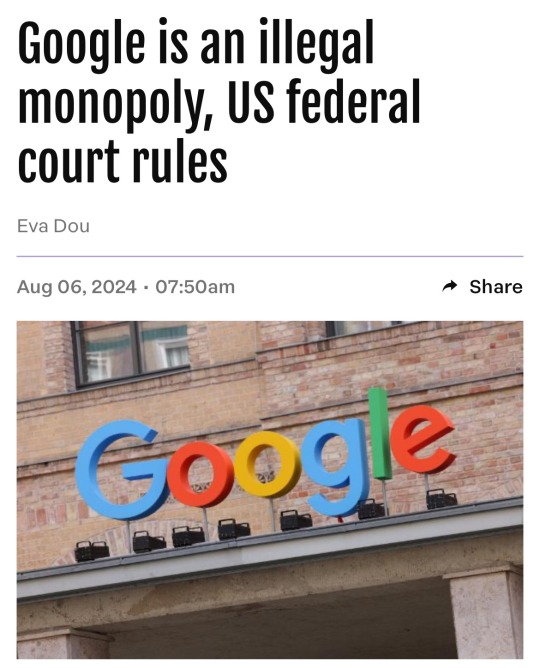

64 notes
·
View notes
Text
In light of recent butchering "nerfs" I want to try to add something positive to my (now former) main+only character
Elliot from Work At a Pizza Place and Forsaken is an antishipper
Fml quitting Forsaken unless this gets rolled back. Devs didn't know what made him useful

#proship DNI#antiship please interact#antiship#anti ship#antitrust#antiproship#anti proship#antishipper#anti shipper#Work At a Pizza Place#Forsaken#Elliot#Forsaken Elliot#Elliot Forsaken
8 notes
·
View notes